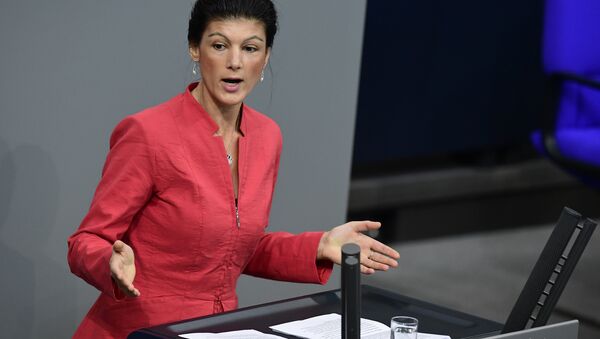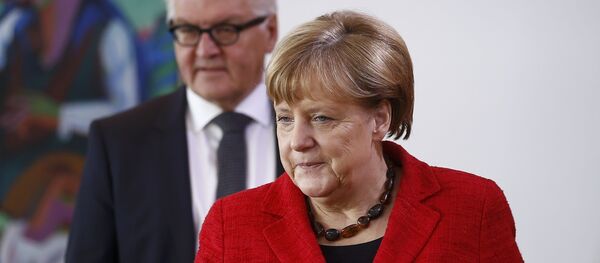During a discussion of Germany's 2017 budget in the Bundestag on Wednesday, Die Linke deputy chair Sahra Wagenknecht accused German Chancellor Angela Merkel and her Christian Democratic Union (CDU)/Christian Social Union (CSU)/Social Democratic Party (SDP) coalition of ignoring the concerns of ordinary citizens.
"In spite of everything the CDU and CSU are persisting with this Chancellor, are seriously looking forward with this woman Merkel," Wagenknecht said.
"People in this country can't look forward to that."
Wagenknecht criticized growing "social inequality and uncertainty" in Germany, which she said has led to more support for the right-wing Alternative for Germany party.
"It is their (the coalition's) common policy which has strengthened the right in Germany," said Wagenknecht, who said that the election of Trump should be a wake-up call for the German establishment too, which has neglected to provide for ordinary people.
"In Germany too, ever more people have good reason to be disappointed and angry about the politics of the Grand Coalition, which doesn't take any more interest in their fears for the future."
Instead of austerity, the German government should be more like Trump and pledge to carry out a "large-scale program of public investment" to stimulate the economy and create jobs, Wagenknecht said.
"Do you think that this is what millions of vulnerable people and Europe's suspended generation have been waiting for? Apparently even Donald Trump has more economic policy understanding than you," Wagenknecht told the coalition.
On Thursday Germany's Der Westen newspaper reported that Horst Seehofer, leader of the Bavarian CSU, the sister party of Angela Merkel's CDU, has invited President-elect Trump to Bavaria.
According to sources in the Bavarian state parliament, Seehofer congratulated Trump on his election victory and said he "is always welcome in Bavaria." Specifically, Seehofer suggested the Munich security conference in February would be a good opportunity to visit the state.
Even before his offer, Seehofer exhibited a more welcoming attitute to Trump than several leading German politicians, who appeared less than enthusiastic about Trump's election victory on November 8.
In contrast, Defense Minister Ursula von der Leyen spoke of her "huge shock" at the result, which she described as "not a vote for him but rather against Washington, against the establishment."
Foreign Minister Frank-Walter Steinmeier commented that "nothing will be easier. Much will be harder," under a Trump presidency, and said that "the result is different from what most people in Germany had hoped to see."
German Chancellor Angela Merkel, who faced sustained criticism from the US President-elect during the campaign as a result of her refugee policy, gave a conditional welcome to the next US president, on the basis of "shared values."





